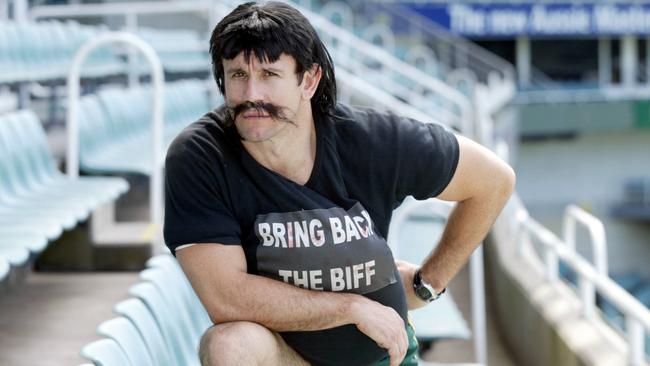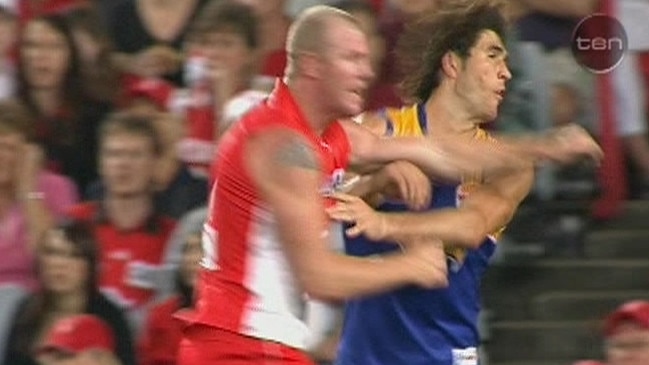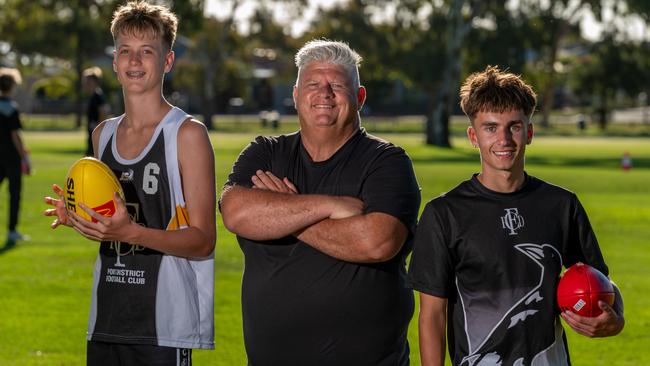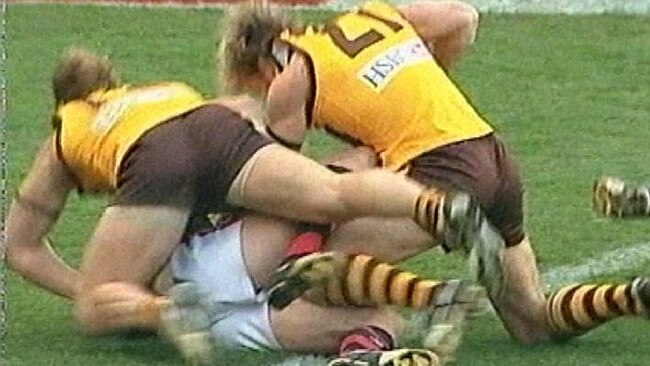Days of celebrating punch-ons and thuggery on the sporting field are dead | David Penberthy
“Bring back the biff” has been a catch cry of many a footy fan over the years. But, as David Penberthy says, those days are dead.
Opinion
Don't miss out on the headlines from Opinion. Followed categories will be added to My News.
“Bring back the biff” was the catchcry of Reg Reagan, rugby league hardman and fictional alter ego of real-life football legend Matty Johns.
Reg longed for the golden era of the game when it was played by real men and unencumbered by poncy rules outlawing the use of the king hit and the coathanger, the rabbit punch and squirrel grip.
Reg might have vanished as a comic persona but you can still hear a bit of Reg-inspired sentiment amid calls to make sport more safe and less violent.
In junior sport, the delayed introduction of tackling for junior players of both rugby league and Aussie rules has been decried by some as creating a generation of cotton wool kids.
JOIN THE CONVERSATION AND HAVE YOUR SAY IN THE COMMENTS BELOW
But in 2024, the days of the Reg Reagan brigade are numbered, if not well and truly over.
There is now so much evidence of the life-altering impact caused by head injuries that it seems genuinely moronic to hark back to some so-called golden age where knocking blokes out or cleaning them up off the ball was ever deemed worthy of celebration.
This medical evidence is underscored by a growing body of case law both here and especially in the US where former players have successfully sued for injuries sustained during this anything-goes era of sport.
The rate of such litigation will only continue in Australia with many ex-players in talks with law firms about class actions.

These medical and legal realities have coalesced in the form of the toughest anti-concussion measures the world has ever seen, via the new guidelines for amateur and junior sport released this week by the Australian Institute of Sport.
The impact of the proposed changes will be massive. It will not only affect the way sport is played; it will affect how it must be staffed, and will probably affect how much it costs.
It may also have an impact on the concussion rules at the most elite level of contact sport, most likely the AFL, where the mandated 12-day concussion rule precluding an injured player from making a return seems cavalier and reckless compared to the new amateur arrangements.
Under the changes for amateurs and juniors, the AIS is recommending a three-week break from play for anyone who suffers a concussion, with anyone who is knocked out twice in one year sitting out the entire season.
One of the most interesting features of the proposal is that while the changes are not mandatory, they are being embraced with vigour by all the major amateur sporting codes, with many clubs having already taken independent steps towards a more vigilant policing of concussion.

I spoke this week with one country football club, the Nuriootpa Tigers, who play Aussie rules in the Barossa Valley town of Nuriootpa in the South Australian wine country.
Even before the AIS proposed the new rules, the club decided last year to partner up with its local Barossa Valley physiotherapist to ensure every player could have a baseline concussion test to determine what shape their heads were in so any future blows could be monitored against that baseline.
Club president Josh Norton said the cost had been significant for their small club, with tests required for every player in the men’s under 13, 15, 17 and senior teams, as well as the women’s under 13, 16 and senior sides – a total bill of $16,000 or $80 a player.
To cover the cost, the players are now paying an extra 40 bucks a year for their club fees, with the club picking up the other $40.
Through their local MP, the club is trying to see if the South Australian government can contribute to the ongoing costs of the program.

“Even before this AIS proposal we had identified in 2023 that we needed to have better concussion policies put in place,” Norton told me.
“It wasn’t in response to one particular incident, we have had concussions like any other club.
“It’s more just a recognition that we need to take this seriously. You can replace knees, you can fix hands, but you only get one brain.”
Aside from the cost of running programs such as concussion baseline testing, clubs will face logistical challenges meeting the other AIS proposal to have a dedicated concussion officer at every game.
This is a huge commitment, especially when you consider how many teams clubs can have.
And having spent four years coaching my son’s school football team, when most of the work fell to a relative few, it is hard to see how clubs will meet this requirement when some weeks you’re flat out finding a parent who can goal umpire.
But again, the most significant long-term result of these new amateur rules will be the pressure they place on elite contact sport to come down harder on protecting the head.

While the desire to win is the same at the elite and amateur levels, professional sport brings with it other extraneous considerations which should have no bearing on whether a player takes the field.
Attendance, TV rights, the financial rewards of membership and merchandise that come with winning finals … none of these factors should have any relevance to whether a bloke or woman is fit to go out on the park.
Viewed from the vantage point of 2024, it is hard to fathom that just 11 years ago many footy fans were tapping into their inner Reg Reagan and lauding the head-high punch-on between Paul Gallen and Nate Myles as the shot in the arm State of Origin needed.
Or that a generation ago, Aussie rules was being promoted through VCR tapes with titles such as “Biggest Hits of the 70s”, celebrating hits that in some cases left their recipients eating through tubes.
Whether you like it or not, the biff is dead.





